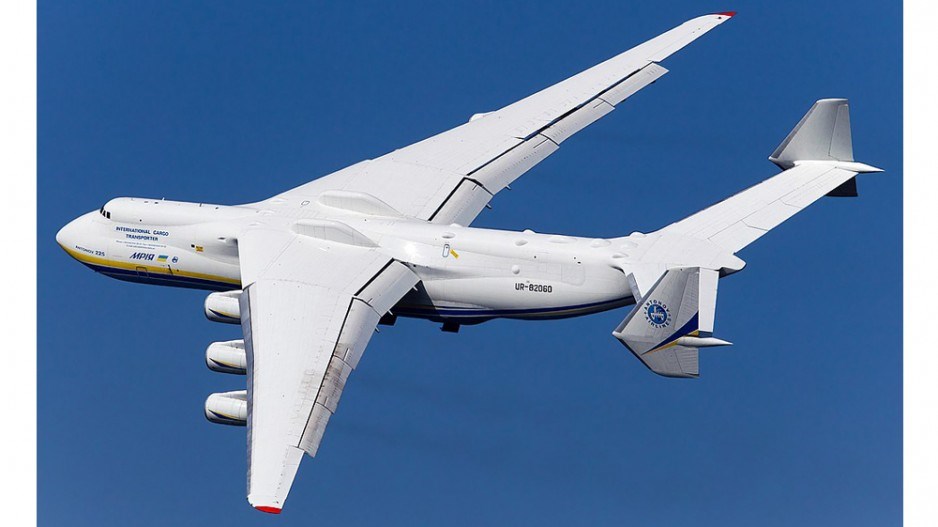The president of a Surrey freight forwarding company is among those in shock about Russia’s invasion of Ukraine and the destruction of the world’s biggest cargo airplane in the opening days of the war.
The Antonov An-225 was built in Ukraine in 1988 to carry the Soviet Union’s version of the Space Shuttle. The destroyed plane with an 88.4-metre wingspan, dubbed Mriya (Ukrainian for “dream”), was emblazoned in Ukrainian blue and yellow and the company estimates it could cost $3 billion to repair. Earlier this week, Russians shelled the Antonov plant in Kyiv and some reports suggest two people died.
Greg Timm said that PCB Freight had chartered the An-225, which could carry up to 250 tonnes, in 2008 to deliver heavy mining equipment for a Canadian company’s operations in Greenland.
“We're all sitting here on the ground, just an absolute shock over this Ukrainian situation,” Timm said. “I think every freight company kind of had a soft spot for that aircraft because it was the only aircraft that big that was approved for charter.”
In 2019, PCB handled the delivery of steam turbines from Japan to the Dominican Republic, using three of the smaller, yet still gigantic, Antonov An-124’s in five phases over a month-and-a-half.
One of the An-124’s in the Russian-owned Volga-Dnepr Airlines fleet landed Feb. 27 at Pearson International Airport in Toronto with a shipment of federally procured rapid antigen test kits. The jet was grounded hours later when Transport Canada immediately closed Canadian airspace to Russian flights.
When two of Ukraine’s Antonov Airlines An-124’s carrying bulk medical supplies landed at Vancouver International Airport on Nov. 11 and 16, 2020, airport officials were both honoured and stunned, according to email obtained under freedom of information.
The day before the plane with a 73.3 m wingspan and tail number UR-82027 arrived, airport operations manager Beth Henschel said YVR and provincial counterparts needed to work together to facilitate their arrival. “As we move into winter, we do have some restrictions on our airfield and certain types of very large aircraft can pose a challenge to us, so advanced planning will help us pave the way.”
The first flight delivered 650 cubic metres or 430 pallets of personal protective equipment supplies after a journey that began in Nanjing, China and included stops in Nagoya, Japan, and Anchorage, Alaska.
“To put it in perspective a fully loaded 767 cargo plane maxes out at 330 CBM which equates to 220 pallets. So twice as many pallets in an Antonov than a 767,” wrote Provincial Health Services Authority (PHSA) chief supply chain officer Todd Cooper.
“This will take a few days to offload and clear customs, then shipped to an offsite location,” chimed in Scott McNair, PHSA’s executive vice-president of business operations.
Cooper remarked to PHSA vice-president Jaci Edgeworth that the Antonov’s arrival “is an event for the airport” because of its enormous cargo space.
PCB Freight operations manager Alex Haukaas wrote that offloading the cargo was “an incredible undertaking.” All pallets were delivered to a warehouse in Tsawwassen. The second plane, tail number UR-82008, was loaded with 410 pallets of medical gowns.
“The amount of protective equipment that came in was just overwhelming, it was coming faster than you could take it right into the hospitals,” Timm said. “So we found storage facilities and warehouses and stuff to put it as they started to kind of burn it off. That's the way it played.”
PCB had the ground handling contract with PHSA, for which it grossed $13.9 million in the fiscal year completed March 31, 2021, according to the agency’s suppliers’ list.
The two flights were chartered for PHSA by its PPE import contractor, Frontline Crossings Medical Supply. Vancouver-based Frontline gross-billed PHSA $218.6 million on the emergency, no-bid contract during the year ended March 31, 2021. CEO Jan Kindler did not respond to interview requests. The B.C. companies database shows Kindler and luxury real estate agent Li Hong Yu (aka Chris Lee) registered the company on March 31, 2020, less than three weeks after the pandemic was declared.



